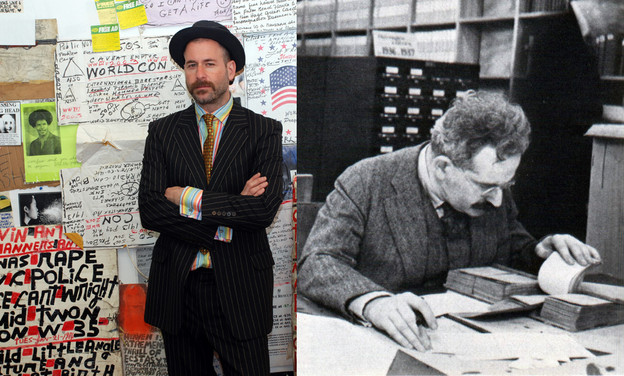
Walter Benjamin, Ludwig Wittgenstein, and Sigmund Freud: if these theorists share any quality at all, they share a reputation for not going easy on their readers. Each of them wrote in a way that exudes a different kind of intellectual difficulty — Benjamin’s sudden swerves into the zone where high relevance meets high irrelevance, Wittgenstein’s austere certainty, Freud’s elaborate flights into the near-fantastical — but all of their work poses a challenge to readers approaching it for the first time. And so Kenneth Goldsmith Sings Theory addresses the obvious question: what if you didn’t read it, but heard it sung instead?
“What is it about academic theory that begs to be, well, sung by people who can’t sing?” asks Goldsmith, poet, prof, UBUweb creator, and WFMU radio host, on the station’s blog. He cites examples from a punk-rockified Theodor Adorno to a Finnish eccentric’s conversion of the Tractatus Logico-Philosophicus into a songbook, eventually coming to his own “adventures into the field,” which you can hear in the Pennsound archive. Just above, we have have Goldsmith singing Benjamin’s “Unpacking my Library” to music by experimental violinist Eyvind Kang [MP3]. “Just as Benjamin lists copies of other books and the associations they bring,” writes Jacob Edmond at Jacket2, “so Goldsmith copies Benjamin, creating an idiosyncratic audio book version. ”
Wittgenstein Part 1
Wittgenstein Part 2
“In his performance of the text, Goldsmith fuses precisely delineated musical sections, or movements, with the chaotic, shifting pitch and tone of his voice, paralleling Benjamin’s observation in the essay that ‘if there is a counterpart to the confusion of a library, it is the order of its catalogue.’ ” Can you find similar parallels between Goldsmith’s manner of singing and the theory he delivers with it when he performs Wittgenstein’s Philosophical Investigations to Igor Stravinsky [MP3 part one, MP3 part two]? Or below, where he sings Sigmund Freud’s The Psychopathology of Everyday Life, starting on the passage of the “slips of the tongue” which have popularly come to bear Freud’s name, to The Who [MP3]? After all, style doesn’t count for much, as such a strikingly dressed character as Goldsmith knows full well, unless it aligns with substance.
Related Content:
Walter Benjamin’s Mystical Thought Presented by Two Experimental Films
Walter Benjamin’s Radio Plays for Kids (1929–1932)
Ludwig Wittgenstein’s Tractatus Gets Adapted Into an Avant-Garde Comic Opera
Sigmund Freud Speaks: The Only Known Recording of His Voice, 1938
Colin Marshall writes on cities, language, Asia, and men’s style. He’s at work on a book about Los Angeles, A Los Angeles Primer, and the video series The City in Cinema. Follow him on Twitter at @colinmarshall or on Facebook.


Kenneth Goldsmith is my favorite singer.